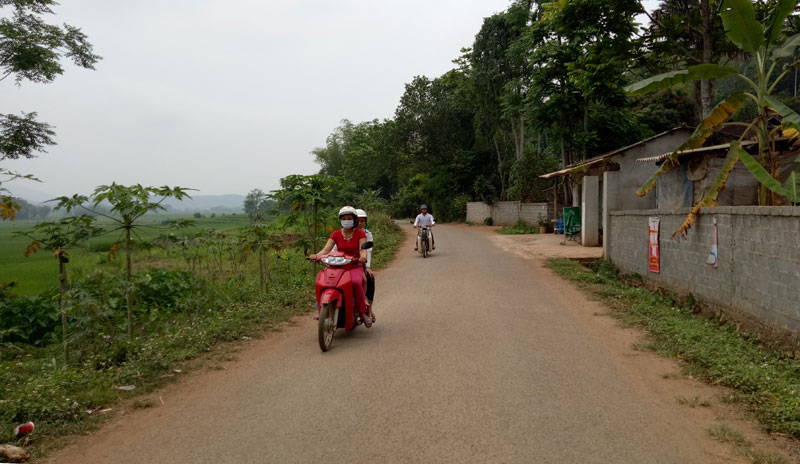
(HBO) – In recent years, Ky Son district has concentrated on maximum resources to develop rural transport, and considered it as a key task of hunger eradication and poverty alleviation. Therefore, the rural transportation network of district has developed comprehensively.

The rural road network of Ky Son district was
invested relatively, and meeting the demand of travelling and exchanging goods
of local people.
In recently, Ky Son district has focused all
resources on investing in the construction of rural transport infrastructures
with the aim of concreting and completing bridges and roads systems linking
communes and towns in order to meet the needs of travelling and promote
economic, cultural and social development. Hence, many places have successfully
implemented the movement of building rural transport infrastructures, which
made the appearance of countryside to get better. Ky Son district currently has
244.45 km of road, particularly in 12 km of asphalt road, 68.9 km of paved
roads, 86.1 km of cement concrete road, 69.14 km of grading road and 8.31 km of
dirt path. The district has four communes meeting the second criteria of
traffic such as Hop Thinh, Mong Hoa, Hop Thanh and Dan Hoa. Three communes of
Phuc Tien, Dan Ha and Phu Minh meet three quotas of the second criteria, and
two communes meet two quotas of the second criteria such as Doc Lap and Yen
Quang.
Every year, the district spends capitals of
over three billion VND on developing rural transportation. For the bridges and
undergrounds, in recent years, Ky Son district has gradually invested on
upgrading in order to serve the needs of travelling, and basically to ensure
technique and safety. At the same time, the district launched the
implementation of the campaign "All people participate in building rural
roads”. Accordingly, the communes mobilized workers to renovate and upgrade
some roads, clear bushes, clear sewers, and embank land to build rural traffic
roads. Also, they should maintain, repair and look after some district, commune
and hamlet roads.
Mr. Hoang Van Minh, Vice Chairman of Ky Son
District People's Committee, said: "Completing the rural traffic system is a
desire and aspiration of the people. Therefore, when there were guidelines and
policies of building roads, people were enthusiastic, willing to donate land
and contributing their working day to complete roads on schedule and to the
highest quality”.
The Department of Education and Training of Hoa Binh province held a conference on March 18 to review the performance of the "Safe and Happy School" Project and set out tasks for 2025. The project, funded by the Taiwan Fund for Children and Families (TFCF), aims to create a safe, inclusive, and supportive learning environment for students. The event saw the attendance of representatives from the TFCF and 26 beneficiary schools.
With over 70% of their workers being women, trade unions across industrial parks (IPs) in Hoa Binh have been actively safeguarding their legal rights and interests while implementing initiatives to improve their income and well-being.
In recent years, the Hoa Binh provincial General Hospital has continuously innovated itself and improved the quality of medical services to meet the increasing needs of local people. With substantial investments in infrastructure and modern equipment, along with a team of highly qualified doctors and nurses, the hospital has gradually established itself as one of the leading medical units in the Northwestern region and a trusted destination for healthcare for people inside and outside the province.
From mastering the fundamentals of programming to achieving national recognition, the Programming Club of the Le Van Tam Primary School (STAR LVT28) in Hoa Binh city has made remarkable strides in the field of robotics.
The Ho Chi Minh Communist Youth Union Committee and the Vietnam Youth Federation chapter of Hoa Binh province organised a programme on March 12 to launch the "Digital Literacy" movement and an online quiz on the resolutions of the Vietnam Youth Federation congresses at all levels, as well as the Politburo's Resolution No. 57-NQ/TW on breakthroughs in the development of science, technology, innovation, and national digital transformation.
As climate change grows more unpredictable, the development of production forests has become essential - not just for economic growth, but for safeguarding the environment and maintaining ecosystem balance. By boosting local incomes, curbing natural disasters, preventing soil erosion, and protecting water resources, these forests play a crucial role in sustainable development.



